amplication and omission 翻译与实践
英译汉
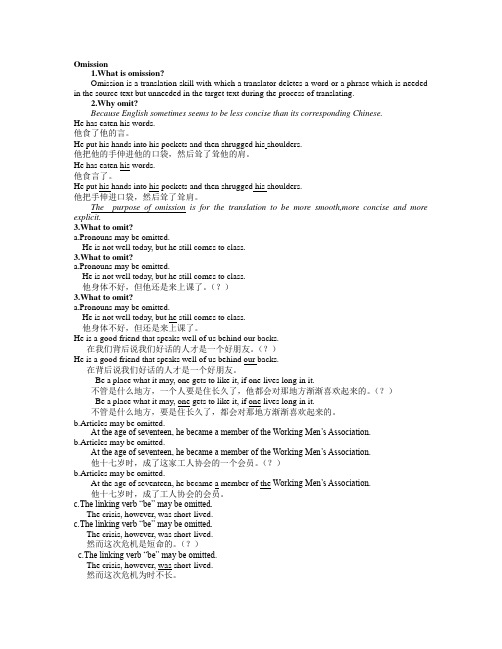
Omission1.What is omission?Omission is a translation skill with which a translator deletes a word or a phrase which is needed in the source text but unneeded in the target text during the process of translating.2.Why omit?Because English sometimes seems to be less concise than its corresponding Chinese.He has eaten his words.他食了他的言。
He put his hands into his pockets and then shrugged his shoulders.他把他的手伸进他的口袋,然后耸了耸他的肩。
He has eaten his words.他食言了。
He put his hands into his pockets and then shrugged his shoulders.他把手伸进口袋,然后耸了耸肩。
The purpose of omission is for the translation to be more smooth,more concise and more explicit.3.What to omit?a.Pronouns may be omitted.He is not well today, but he still comes to class.3.What to omit?a.Pronouns may be omitted.He is not well today, but he still comes to class.他身体不好,但他还是来上课了。
Omission

From the Grammatical Aspect
一、Omission of pronoun 1.省略作主语的人称代词 (1) 根据汉语习惯,前句出现一个主语,后 句如仍为同一主语,就不必重复出现。英 语中通常每句都有主语,因此人称代词做 主语往往多次出现,这种人称代词汉译时 常常可以省略。但省去的人称代词在意思 上仍明显地包含在译文里。
Her dark hair waved untidy across her broad forehead, her face was short, her upper lip short, showing a glint of teeth, her brows were straight and dark, her lashes long and dark, her nose straight. 她的黑发蓬蓬松松地飘拂在前额上,脸是 短短的,上唇也是短短的,露出一排闪亮 的牙齿,眉毛又直又黑,睫毛又长又黑, 鼻子笔直。
4.省略物主代词
在英语句子里的物主代词,出现的频率很高。一 个句子中往往会出现好几个物主代词,如果将每 个物主代词都翻译出来那么汉语译文就显得非常 罗嗦。所以在没有其他人称的物主代词出现的情 况下,在翻译的时候物主代词大多省略。 例如: I wash my hands before having my lunch. 汉语只需说“我吃午餐前洗手”,而不必说“我 吃我的午餐前洗我的手”。
Why do we feel cooler when we fan ourselves? 扇扇子时为什么会感到凉快些? He put his hands into his pockets and then shrugged his shoulders. 他将双手放进衣袋,然后耸了耸肩。
【大学 笔译精品】4.2_amplification_and_omission(1)
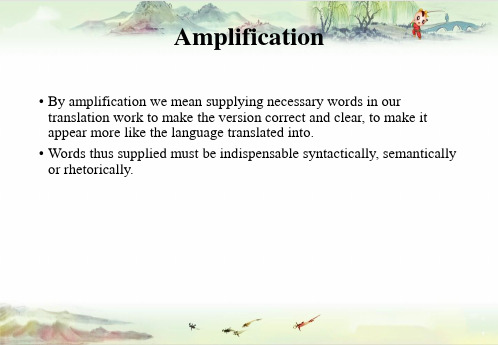
(又是)上菜啊, (又是)切面包啊, (又是) 说啊, (又是)笑啊, (又是)敬酒啊,忙个不 停。(增加语气助词和概括词语)
增译法/增词法
• 英汉两种语言由于表达方式不尽相同,翻译时常常 有必要在译文的词量上作适当的增加,使译文既能 忠实地传达原文的内容和风格,又能符合译入语的 表达习惯。但是增词必须是根据具体情况增加非增 加不可的词语。增词一般用于以下三种情况:
• 失踪事件接二连三地发生,显然越来越频繁。
• Conjunctions & articles: • 虚心使人进步,骄傲使人落后。
• Modesty helps one to go forward, whereas conceit makes one lag behind.
• 留得青山在,不怕没柴烧。
the place nor the time for a lecture or an argument. • 我真替她万分担忧,但此时此地既不宜教训她一番,
也不宜与她争论一通。
• Tense markers:
• English prose is elaborate rather than simple. It was not always so.
• 现今英国散文华巧而欠简朴,过去却并非总是如此。 • I had imagined it to be merely a gesture of affection,
but it seems it is to smell the lamb and make sure that it is her own… • 原来我以为这不过是一种亲热的表示,但是现在 看来,这是为了闻一闻羊羔的味道,来断定是不 是自己生的。
Omission省略翻译法的运用课件

• Omission of the pronoun in comparative sentence • The climate in Switzerland is absolutely different from that in Somalia. • 瑞士的气候与索马里截然不同。
Omission省略翻译法的运用
• 她的黑发蓬蓬松松地飘拂在前额上,脸是短短的,上唇也是短短 的,露出一排闪亮的牙齿,眉毛又直又黑,睫毛又长又黑,鼻子 笔直。
Omission省略翻译法的运用
• In order to survive, to feed, clothe and shelter himself and his children, man is engaged in a constant struggle with nature.
Omission省略翻译法的运用
• 连着两星期他都在观察房子的情况,检查各个房间,查看线路、 通道和花园的布局。
Omission省略翻译法的运用
• Her dark hair waved untidy across her broad forehead, her face was short, her upper lip short, showing a glint of teeth, her brows were straight and dark, her lashes long and dark, her nose straight.
his shoulders. • 他将双手放进衣袋,然后耸了耸肩。
Omission省略翻译法的运用
• For two weeks, he had been studying the house, looking at its rooms, its electric wiring, its path and its garden.
12-Amplification & Omission(a)
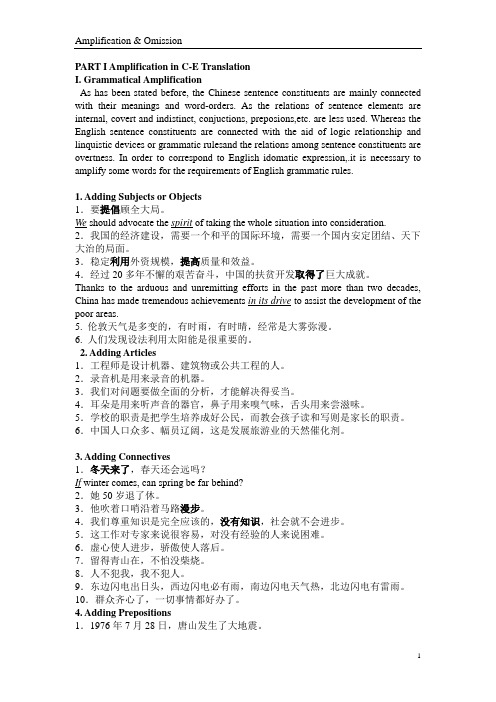
PART I Amplification in C-E TranslationI. Grammatical AmplificationAs has been stated before, the Chinese sentence constituents are mainly connected with their meanings and word-orders. As the relations of sentence elements are internal, covert and indistinct, conjuctions, preposions,etc. are less used. Whereas the English sentence constituents are connected with the aid of logic relationship and linquistic devices or grammatic rulesand the relations among sentence constituents are overtness. In order to correspond to English idomatic expression,.it is necessary to amplify some words for the requirements of English grammatic rules.1. Adding Subjects or Objects1.要提倡顾全大局。
We should advocate the spirit of taking the whole situation into consideration.2.我国的经济建设,需要一个和平的国际环境,需要一个国内安定团结、天下大治的局面。
3.稳定利用外资规模,提高质量和效益。
翻译基础6 词和省略

2) My father is cooking, but my mother watching TV. • 我爸爸在煮饭,而妈妈 正 看电视。
3) I knew it quite well as I know it now. • 我当时(过去)就跟现在一样清楚。
• 这真是物Biblioteka 价廉,你不买会后悔的。2) She was walking in the street alone, weary and ragged.
• 她独自一人走在大街上 , 面容 憔悴, 衣衫 烂篓。
3) She is extroverted, smiling all the day. • 她 性格 开朗,整天 面 带笑容。
根据意义或修辞上的需要以及惯用法的需要, 增译的情况可以概括为以下12种:
1. Adding verbs
• 英语中重复用词的情况较少,而汉语有时为了达到一定的 修辞效果,经常使用重叠或排比句,翻译成汉语时需要在 名词前增加动词。
• 1) In the evening, after the banquets , the concerts and the table tennis exhibitions , he would work on the drafting of the final communiqué.
• 3)As he sat down and began talking, words pour out. • 他一坐下来就讲开了,滔滔不绝地讲个没完。
4. Adding nouns.
4.1 在不及物动词后增加名词 由于英语中有及物动词和不及物动词之分,有时宾语隐藏在 动词后面,翻译成汉语时需要把宾语补充出来。
笔译

Translation skill 2: amplification/addition & omission●amplification/addition ---supplying necessary words on the basis of accuratecomprehension of the original.●Omission–subtract( vt. 减去;扣掉superfluous adj. 多余的;不必要的;[废]奢侈的)meaning from the original.? The best conductor has the least resistance and the poorest the greatest.最好的导体电阻最小,最差的导体电阻最大。
? The mountains began to throw their long blue shadows over the valley.群山开始向山谷投下一道道蔚蓝色长影。
? Heated, water will change into vapor.水如受热,就会汽化。
? 虚心使人进步,骄傲使人落后。
modesty helps one go forward, whereas conceit makes one lag behind.? 三个臭皮匠,赛过诸葛亮。
Three cobblers with wits combined equal Zhuge liang the master mind.Supply words to make an abstract concept clear? He was moved by Mike’s story and impressed by his dedic ation.? He was described as impressed by your flexibility.? Use abstract instead of concreteUse abstract instead of concrete? 让我们谈谈文艺问题Let’s talk about literature and arts.? 根据科学家的看法,According to scientists,….For the rhetoric (n. 修辞,修辞学;华丽的词藻adj. 花言巧语的)requirement? Women screamed, kids howled, but the men stood silent, interested in the outcome.? 她生性沉静而腼腆,只有在家里最自在。
4.2 amplification and omission

Plural meaning: The lion is the king of animals. 狮子是百兽之王。 I saw bubbles rising from under the water. 我看见一个个水泡从水下冒了出来。 Disappearances occurred with apparently increasing frequency. 失踪事件接二连三地发生,显然越来越频繁。
Omission
Omission is a technique opposite to amplification. As a matter of principle, a translator is not supposed to subtract any meaning from the original work. However, this does not mean that a translator should refrain from omitting any words at all in translation. In fact, nothing shows greater difference in syntax between English and Chinese than the omission of words in the sentence. What is considered necessary, indispensable and even a characteristic feature in one language may be deemed useless, superfluous or even a stumbling block in the other.
Omission of a preposition
英汉互译UnitOmission省译法
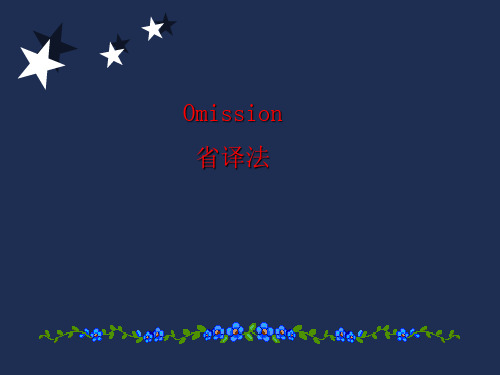
16
2. Omitting the Meticulous
Expression in the Original
Please expedite the L/C so that we may execute the order smoothly.
请加速开出信用证,以便顺利执行定单。 For further information regarding this
3
Motivation
Omission is based on the disparity in wording and the differences in syntax between English and Chinese. On the one hand, we have no articles or infinitive markers in Chinese. On the other hand, Pronouns, conjunctions, and prepositions are more frequently used in English than in Chinese. When translated into Chinese, many of them should be omitted so as to conform the rendering to the accustomed usage of Chinese expression.
Due to Syntactic Considerations
1. Omitting the Pronouns 2. Omitting the Articles 3. Omitting the Prepositions 4. Omitting the Conjunctions 5. Omitting the Verbs 6. Omitting the Impersonal Pronoun “It”
amplication
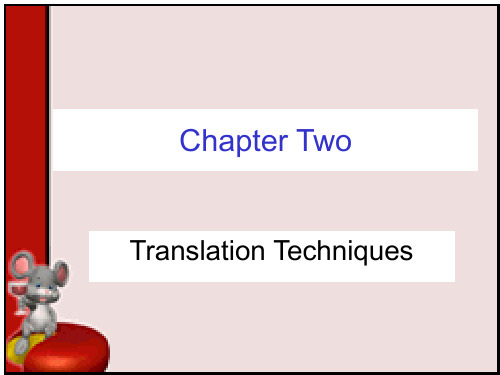
5. The very earth trembled as with tramps of horses and murmur of angry men. 连大地都震动了,仿佛万马奔腾,千夫 怒吼。(修辞) 6. Asia’s strength of economic management, however, has not been its perfection, but its pragmatism and flexibility. 亚洲经济管理向来不以完美见长 , 而是 以务实和弹性取胜.(增加动词词组)
11. Histories make men wise; poets witty; mathematics subtle; natural philosophy deep; morality grave; logic and rhetoric able to contend. 读史使人明智,读诗使人灵秀,数学使人周密, 科学使人深刻,伦理使人庄重;逻辑修辞之学 使人能够善辩。 12. Reading makes a full man; conference a ready man; and writing an exact man. 读书使人充实,讨论使人机智,笔记使人准确。
3. AmplificatioFra bibliotek (增词)增加 原文中 虽无其词 而有其意 词
Amplification: to add some words, words groups even sentences on the basis of original text so that the translated text conforms to the target language grammar and language habits, and corresponds to source language text in terms of culture, content, forms and spirit. (增词必须是根据具 体情况增加非增加不可的词语。增词一般用于 以下三种情况:一是为了语法上的需要;二是 为了意义上的需要;三是为了修辞上的需要。 增词法在英汉翻译中是添加原文中虽无形式,但 意在其中的成分. )
(5)Amplification and Omission
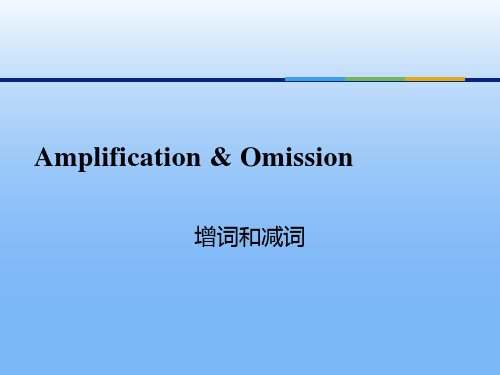
6. Adding words of tense 增加表示时态的词 英语动词的时态靠动词词形变化(如write, wrote)或加助动词(如will write,have written )来表达的。汉语动词没有词形变化,表示时的词。因此,翻译完成时往往用“曾”、“ 已经”、“过”、“了”;翻译进行时往往用 “在”、“正在”、“着”;翻译将来时往往 用“将”、“就”、“要”、“会”、“便” 等等。除此之外,为了强调时间概念或强调时 间上的对比,往往须加一些其他的词。
Amplification
in Chinese-English Translation
1. Adding pronouns 1)大作收到,十分高兴。 I was very glad to have received your writing. 2)没有调查研究就没有发言权。 He who makes no investigation and study has no right to speak. 3)交出翻译之前,必须读几遍,看看有没有要修改 的地方。 Before handing in your translation, you have to read it over and over again and see if there is anything in it to be corrected or improved.
1.Adding Verbs 1)In the evening ,after the banquets,the concerts and table tennis exhibitions,he would work on the drafting of the final communiqué.
2. Adding Adj. & Adv.
amplication翻译介绍

Amplification&Omission词汇翻译

Omission
• “走出去”战略的实施,有利于中国以全 走出去”战略的实施, 球视野寻求经济发展空间, 球视野寻求经济发展空间,更加积极主动 地参与国际分工与合作。 地参与国际分工与合作。 • The implementation of the “going global” strategy is helpful for China to explore economic development from a global perspective and take a more active part in the international division of labour and cooperation on our own initiative.
Amplification
• Like all large cities throughout the world, New York has old problems to solve and new ones to face. Slums must be cleared and new housed must be built. • 像世界上许多大城市一样,纽约既要解决 像世界上许多大城市一样,纽约既要 既要解决 老问题,又要面对新问题 既要拆除贫民 面对新问题。 老问题,又要面对新问题。既要拆除贫民 又要建造新房子 建造新房子。 窟,又要建造新房子。
Amplification
• 以经济合作为重点,逐步拓展全方位合作 以经济合作为重点,逐步拓展全方位合作。 • We should take economic cooperation as the key focus and develop all-round cooperation in a step-by-step fashion.
英语翻译与写作-Omission
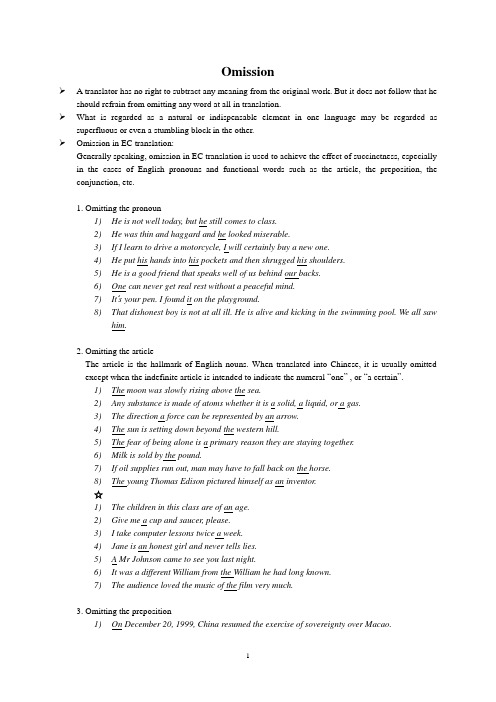
OmissionA translator has no right to subtract any meaning from the original work. But it does not follow that heshould refrain from omitting any word at all in translation.What is regarded as a natural or indispensable element in one language may be regarded as superfluous or even a stumbling block in the other.Omission in EC translation:Generally speaking, omission in EC translation is used to achieve the effect of succinctness, especially in the cases of English pronouns and functional words such as the article, the preposition, the conjunction, etc.1. Omitting the pronoun1)He is not well today, but he still comes to class.2)He was thin and haggard and he looked miserable.3)If I learn to drive a motorcycle, I will certainly buy a new one.4)He put his hands into his pockets and then shrugged his shoulders.5)He is a good friend that speaks well of us behind our backs.6)One can never get real rest without a peaceful mind.7)It’s your pen. I found it on the playground.8)That dishonest boy is not at all ill. He is alive and kicking in the swimming pool. We all sawhim.2. Omitting the articleThe article is the hallmark of English nouns. When translated into Chinese, it is usually omitted except when the indefinite article is intended to indicate the numeral “one” , or “a certain”.1)The moon was slowly rising above the sea.2)Any substance is made of atoms whether it is a solid, a liquid, or a gas.3)The direction a force can be represented by an arrow.4)The sun is setting down beyond the western hill.5)The fear of being alone is a primary reason they are staying together.6)Milk is sold by the pound.7)If oil supplies run out, man may have to fall back on the horse.8)The young Thomas Edison pictured himself as an inventor.☆1)The children in this class are of an age.2)Give me a cup and saucer, please.3)I take computer lessons twice a week.4)Jane is an honest girl and never tells lies.5) A Mr Johnson came to see you last night.6)It was a different William from the William he had long known.7)The audience loved the music of the film very much.3. Omitting the preposition1)On December 20, 1999, China resumed the exercise of sovereignty over Macao.2)The news has already spread along the streets and lanes.3)She soon fell asleep with the light still burning.4)Now complaints are heard in all parts of that country.5)Many new factories have been set up since liberation in their home town.4. Omitting the conjunctionConjunctions are not frequently used in Chinese. The connection between sentences are more often implied than directly conveyed through conjunctions. English is just the opposite in this respect.1)I came here in 1972 and I have lived here ever since.2)As he had been up since 4 a.m. he was no doubt now very tired.3)It may be a long time before an immigrant can fully get used to the customs and habits of thecountry to which he moves.4)If winter comes, can spring be far behind?5)You can describe this policy as rigid and inflexible, when, in fact, it has been extremelyflexible.6)Because it was getting dark, I had to say good-bye.5. Omitting the verb1)These suggestions are so valuable that we must put them into practice.2)He is in a stormy mood.3)Startled as he was, he did not lose his balance.6. Omitting the impersonal pronoun “it”This often occurs when “it”stands for time, weather, distance, or formal subject / object of a sentence.1)Outside it was pitch dark and it was raining cats and dogs.2)How far is it from the school to the zoo?3)It was very noisy outside at the moment.4)It was with some difficulty that he found the way to his house.5)It is only shallow people who judge by appearances. 只有浅薄的人才会以貌取人。
综英三上Unit 4 Love Is a Fallacy 全文翻译

查尔斯.兰姆是一个世所罕见的性情欢快、富有进取心的人,他那笔下的散文《古瓷器》和《梦中的孩子》无拘无束、自由奔放。
实在令人难忘。
下面这篇文章比兰姆的作品更加自由奔放。
实际上,用"自由奔放"的字眼来形容这篇文章并不十分确切,或许用"柔软"、"轻松或"轻软而富有弹性"更为恰如其分。
2尽管很难说清这篇文章是属于哪一类,但可以肯定它是一篇散文小品文。
它提出了论点引用了许多例证,并得出了结论。
卡菜尔能写得更好吗?罗斯金呢?3这篇文章意在论证逻辑学非但不枯燥乏味而且活泼、清新、富于关感和激情,并给人以启迪。
诸位不妨一读。
——作者的说明4我很冷静,也很有逻辑。
敏锐、精打细算、通透、敏锐--这些我都有。
我的大脑像发电机一样强大,像化学家的天平一样精确,像手术刀一样透彻。
而且,想想看!我才18岁。
-我当时只有18岁。
5一个如此年轻的人拥有如此巨大的智力是不常见的。
以我在明尼苏达大学的室友佩蒂-伯奇为例。
同样的年龄,同样的背景,但却笨得像头牛。
一个足够好的家伙,你明白的,但没有什么上进心。
情绪化的类型。
不稳定。
印象深刻。
最糟糕的是,他是个时尚主义者。
我认为,流行是对理性的否定。
被卷进每一个新出现的热潮中,把自己交给白痴,只是因为其他人都在这样做--这对我来说,是无意识的顶峰。
然而,对佩蒂来说不是。
6一天下午,我发现佩蒂躺在床上,脸上的表情非常痛苦,我立即诊断为阑尾炎。
"不要动,"我说,"不要吃泻药。
我去找医生。
"7"浣熊",他厚厚地嘟囔了一句。
8"浣熊?" 我说,在我的飞行中停顿了一下。
9"我想要一件浣熊大衣,"他哭着说。
10我察觉到他的麻烦不是身体上的,而是精神上的。
"你为什么想要一件浣熊大衣?"11"我早该知道,"他哭着说,捶着太阳穴。
考研英语2018-翻译-中英文句法对比
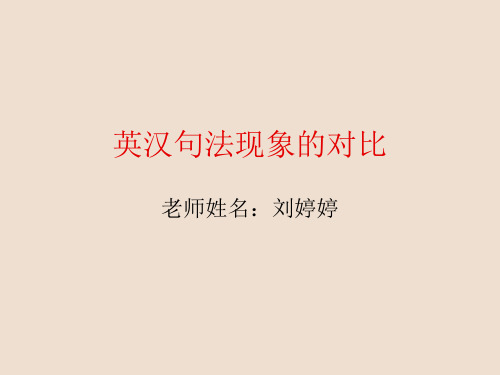
5. If you give him an inch, he will take a mile. 得寸进尺。
Conversion
1. Mary was English and French teacher for two years at the Jewish school. 玛丽在那所犹太学校里教过两年英文和法 文。 (changing the part of speech)
5. 语言这个东西不是随便可以学好的,非 下苦功不可。 The mastery of language is not easy and requires painstaking effort. 6. 少说空话,多做工作。 There must be less empty talk and more hard work.
8. Our men had gone quite a distance off before the enemy’s reinforcement troops came up. 我们的队伍已经走得很远了,敌人的增援 部队才赶上来。 英语主从复合句-汉语联合复句)
9. This place is really beautiful, and many people bring their wives and families out here to live. 这地方实在漂亮,所以许多人都把他们的 家小搬来居住。 (英语并列句-汉语偏正复合句)
4. Reading maketh a full man; conference a ready man; and writing an exact man. 读书使人充实,讨论使人机智,笔记使人 准确。 (amplication) 5. Theory is something but practice is everything. 理论固然重要,实践尤其重要。
实用英语翻译5 Amplification & Omission
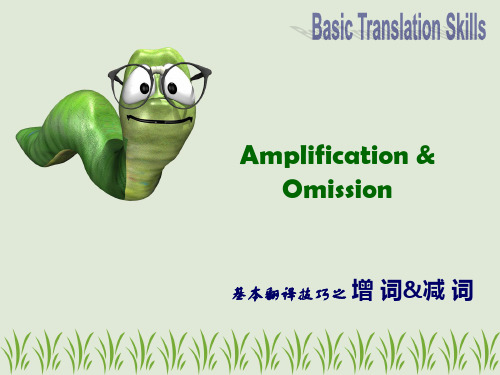
主语
• 汉语中有许多没有主语的句子,英语则一般需要主 语; 另外汉语中很多名词前都没有代词,需要增补。
• 大作收到,十分高兴。 • I am very glad to have received your writing. • 没有调查就没有发言权。 • He who makes no investigation and study has no
• It’s better to be wise by the defeat of others than to be wise by the defeat of your own.
• 从别人的失败中吸取教训比从自己的失败中吸取教 训更好。
• The fox may grow old, but never good. • 狐狸会变老,永远难变好。 • 江山易改本性难移。
• 虚心使人进步,骄傲使人落后。 • Modesty helps one go forward, whereas conceit
makes one lag behind. • 姐姐在等我,我得走了。 • My sister is expecting me, so I must be off now. • 他不来我不走。 • I shall not go until he comes.
Amplification & Omission
基本翻译技巧之 增 词&减 词
Amplification Omission Translation of Letters Exercises
Amplification
增词法
How to translate the “wash”?
1) Mary washes before meals. 2) Mary washes after getting up. 3) Mary washes for a living. 4) Mary washes in a restaurant.
amplication翻译介绍
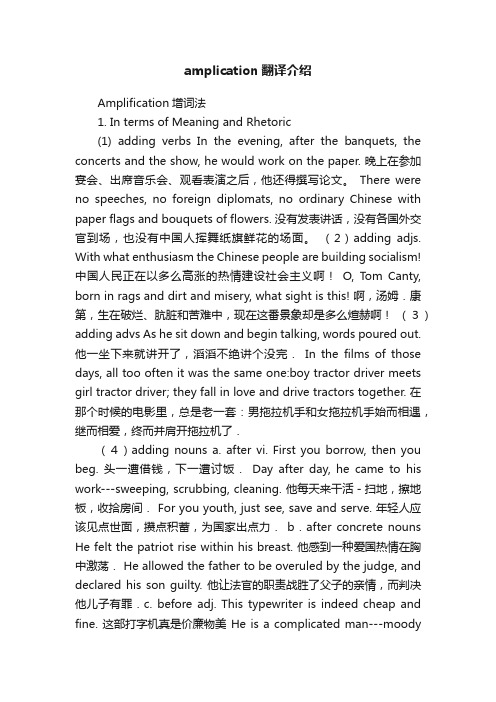
amplication翻译介绍Amplification增词法1. In terms of Meaning and Rhetoric(1) adding verbs In the evening, after the banquets, the concerts and the show, he would work on the paper. 晚上在参加宴会、出席音乐会、观看表演之后,他还得撰写论文。
There were no speeches, no foreign diplomats, no ordinary Chinese with paper flags and bouquets of flowers. 没有发表讲话,没有各国外交官到场,也没有中国人挥舞纸旗鲜花的场面。
(2)adding adjs. With what enthusiasm the Chinese people are building socialism! 中国人民正在以多么高涨的热情建设社会主义啊!O, T om Canty, born in rags and dirt and misery, what sight is this! 啊,汤姆.康第,生在破烂、肮脏和苦难中,现在这番景象却是多么煊赫啊!(3)adding advs As he sit down and begin talking, words poured out. 他一坐下来就讲开了,滔滔不绝讲个没完.In the films of those days, all too often it was the same one:boy tractor driver meets girl tractor driver; they fall in love and drive tractors together. 在那个时候的电影里,总是老一套:男拖拉机手和女拖拉机手始而相遇,继而相爱,终而并肩开拖拉机了.(4)adding nouns a. after vi. First you borrow, then you beg. 头一遭借钱,下一遭讨饭.Day after day, he came to his work---sweeping, scrubbing, cleaning. 他每天来干活-扫地,擦地板,收拾房间. For you youth, just see, save and serve. 年轻人应该见点世面,攒点积蓄,为国家出点力.b.after concrete nouns He felt the patriot rise within his breast. 他感到一种爱国热情在胸中激荡. He allowed the father to be overuled by the judge, and declared his son guilty. 他让法官的职责战胜了父子的亲情,而判决他儿子有罪.c. before adj. This typewriter is indeed cheap and fine. 这部打字机真是价廉物美 He is a complicated man---moodyand mercurial. 他是个性格复杂的人-喜怒无常,反复多变. d. after abstract nouns Persuasion 说服工作Preparation准备工作Backwardness 落后状态 Tension 紧张局势 Arrogance 自满情绪Madness 疯狂行为 Antagonism 敌对态度(5)plurality增加复数词 a.reduplicative words Flowers bloom all over the yard. 朵朵鲜花开满了庭院 Newsmen went flying off to Mexico. 记者纷纷飞到墨西哥去了. There are rows of houses which he has never seen before. 一排排的房子,都是他从未见过的b. numerals The lion is king of animals. 狮子是百兽之王. The emperors in China shared the same character---skeptical. 中国的历代皇帝都有一个共同的特点-生性多疑. (6) words to show tense. I had once needed so much your encouragement. 当年,我曾是那么需要你的鼓励.Roger was, and remain, grateful for what she did for his family. 对于她为他家的付出,罗杰过去很感激,现在仍然很感激. You were and are my best friend. 你过去是现在仍然是我最好的朋友. I was a business man, and now a teacher. 过去我是个生意人,而如今是名教师.过去我是做生意的,如今为人师表.(7)modal particle(语气助词) Don’t take it seriously! I’m just making fun of you. 不要认真嘛!As for me, I didn’t agree from the very beginning. 我呢,从一开始就不赞成. He described his homeland—its forests, its villages, its people--- which could arise only out of deep love for one’s native. 他描绘家乡的风土人情-森林啦,村庄啦,父老乡亲啦-只有深深热爱家乡的人才能说得如此娓娓动听.(8) quantifier (量词) A bike , a mouth, a lady, a piano… A red sun rose slowly from the calm sea. A stream was winding its way through the valley into the river. Once , they had a quarrel. I want to have a rest because I am tired out.9.background Obama’s Asian trip is later proved fruitful. 美国总统...What little boy brought to Japanese people is nothing but tears and blood. 二战期间投下的第一颗原子弹...10 Transitional words Yes, I like Chinese food. Lots of people do these days, sort of the fashion. 不错,我喜欢中国菜.现在很多人喜欢中国菜,这算是有点赶时髦吧!For mistakes had been made, bad ones. 因为已经犯了许多错误,而且还是严重的错误.11. 概括词general words In short, and so on …总之,等等。
Lecture 10-Omission

• In C-E translation, we have to amplify by supplying the article or the possessive pron. Or the relative pron. Or relative adv. where necessary, in E-C translation such particles should normally be omitted in the Chinese version.
• Her dark hair waved untidy across her broad forehead, her face was short, her upper lip short, showing a glint of teeth, her brows were straight and dark, her lashes long and dark, her nose straight. • 她的黑发蓬蓬松松地飘拂在宽阔的前额上, 脸是短短的上唇也是短短的,露出一排闪 亮的牙齿,眉毛又直又黑,睫毛又长又黑, 鼻子笔直。
• The door was opened, and they came in. • 门开了,他们走了进来。 • Now, if we put this sofa against the wall and move everything out of the room except the chairs, don’t you think it all right. • 你们看,把这个沙发贴墙放,把屋子里的 东西都搬出去,单留下椅子,怎么样?
- 1、下载文档前请自行甄别文档内容的完整性,平台不提供额外的编辑、内容补充、找答案等附加服务。
- 2、"仅部分预览"的文档,不可在线预览部分如存在完整性等问题,可反馈申请退款(可完整预览的文档不适用该条件!)。
- 3、如文档侵犯您的权益,请联系客服反馈,我们会尽快为您处理(人工客服工作时间:9:00-18:30)。
amplication and omission
既能忠实地传达原文的内容 和风格,又能符合译文语的 表达习惯。
增词
1)A book, tight shut, is but a block of paper
译文一:一本书,紧紧合上,只是一叠纸。 译文二:一本书,如果紧紧合上不读,只是一叠纸。 译文三:一本书,如果紧紧合上不读,只是一叠废纸。 译文四:闲置之书只是一叠废纸。
(2) 减去陈腐或不必要套语
We take this opportunity to inform you that we are now in position to make prompt shipment of the merchandise. 兹奉告,该商品可即期装运。(译文比原文大为 简明,除减去了"take this opportunity"这一陈 腐表达外,还省略了三个代词,并用一个“可” 字代替了原文中"in a position"这样的繁复表达 方式。)
减词
由于两种语言表达习惯不同,翻译时如果一字不漏地照搬,往往会显 得累赘、拖沓、 冗杂、或不合行文习惯,甚至产生歧义。采取减词译法可以使译文言 简意赅。涉外文
书翻译常有以下几种减词情况:
(1) 减去代词
这种情况尤见于外贸信件翻译,例如:
1)We assure you of our prompt attention to this matter. 我们保证立即处理此事。 2)You are kindly requested to let us have your best quotation for the canned fish. 请报鱼罐头最惠价。
2)Success is often just an idea away.
译文一:成功往往只是一个念头的距离。 译文二:成功往往只是一念之差。 译文三:成功与否往往只是一念之差。
译文一让人看后莫名其妙;译文二改变说法,但仍让人似懂非 懂,而译文三只是简简单单增加了一个“与否”,但却使人豁 然开朗!原句意思表达得淋漓尽致。如同文学翻译一样,经贸 文字翻译增词现象也是千变万化。下面实例可供学习者体会 增词原理和技巧。
3)The price of the products should be set according to the price in the international market. It should be fixed by the two parties at a level that will bring profit to both.
1)All cash bonus shall be subject to income tax. 所有现金红利,均须缴纳所得税。根据汉语行文习惯, 增加动词。) 2)It's more expensive than it was last time but not as good 价钱比上次高,但质量却比上次差。(增补原文省略部 分,原句后半句完整形式应该是:...but it's not as good as it was last time.) 3)The application of plastics in automobile industry has brought about great increase of the consumption. 塑料在汽车工业上的使用大增加了塑料消费量。(增补 原文省略部分,以使意思更加清楚。) 4)Commission depends on the quantity of goods ordered 佣金多少取决于订货量大小。(增词以使译文语意完整, 更符合汉语表达习惯。)
产品价格应该根据国际市场价格,由双方共同商定,须照顾到双方利益。(译文看 似没译"at a level",但字里行间却含有其意。)
4)Part-time waitress applicants who had worked at a job would receive preference over those who had not. 应聘兼职女服务员者,有工作经验优先录用。(如果不省略,译成“应 聘兼职女服务员者,有工作经验,比没有工作经验,优先录用”,其中 “比没有工作经验”就属多余了。)
上面同一个句子四个译文,可以体现 翻译不同层次。译文一,与原文似乎 丝丝入扣,但却显得支离破碎、关系 不清、语意不足;译文二,增加了 “如果……不读”,意思明白无误, 只是觉得言犹未尽;译文三,又增加 了一个废字,这可是点睛之举。能否 译出这个废字,是翻译这个句子的关 键。一个废字,说话者语意才得以充 分表达。译文三不足之处,就是行文 拖沓累赘;而译文四则简明扼要,笔 酣墨浓了。
5)Suitable for men, women and childred goods 互通有无
(3)、减去不言而喻或冗杂词语
1)Any expenses accruing from this credit inquiry will be gladly paid on receipt of your bill. 对此信用咨询所需任何费用,在接到账单后即付。 2)On condition that you sign this receipt, I will pay the money. 你在收据上签字,我就付款。(原文是通过连词来表示“条件”,而汉语 则是通过从句和主句前后顺序来表达这一关系。)
